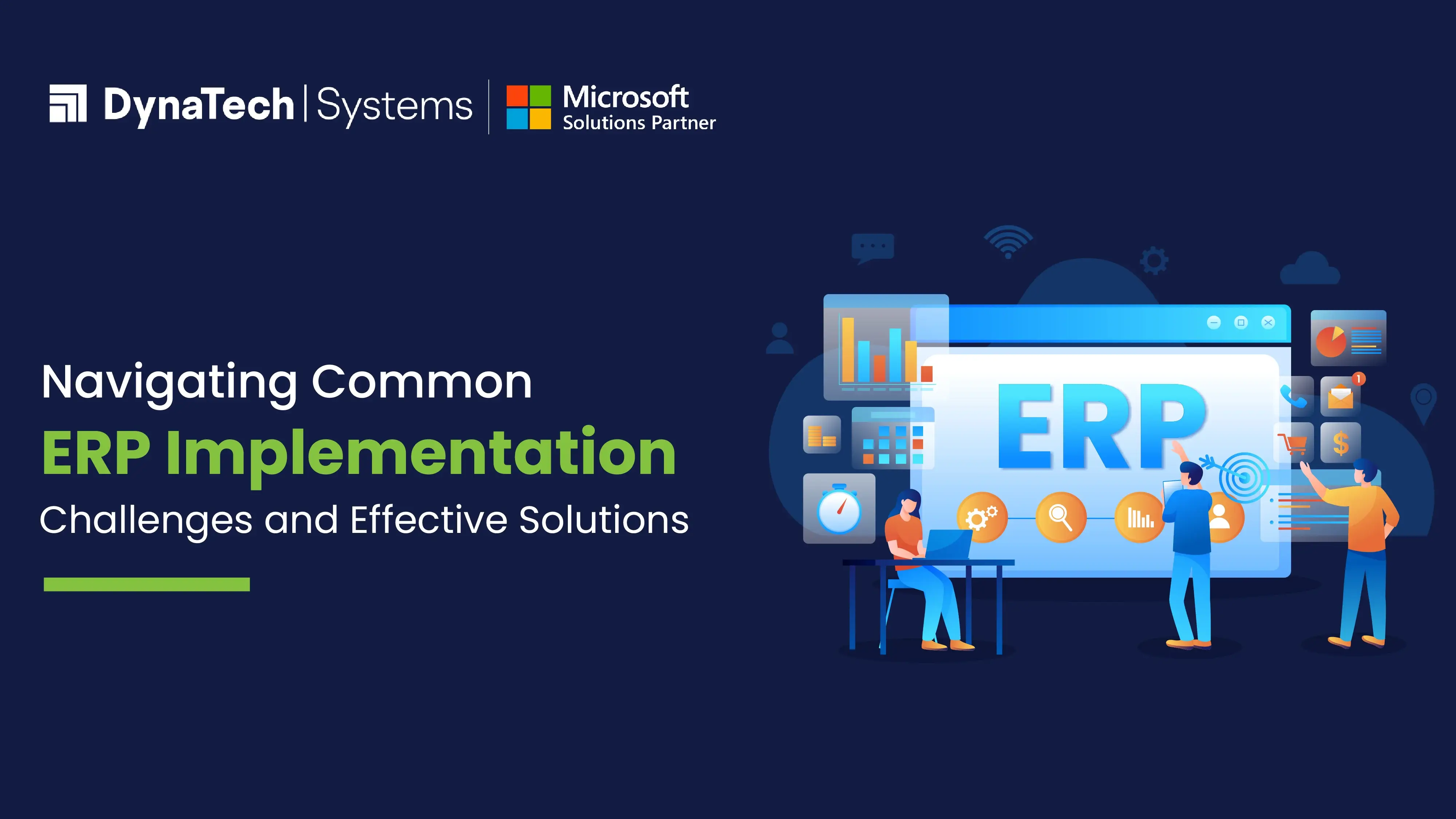In the dynamic landscape of modern business operations, ERP systems have emerged as indispensable tools for organizations seeking operational efficiency, streamlined processes, and data-driven decision-making. With the transition towards cloud-based ERP solutions, businesses are presented with unprecedented opportunities for scalability, flexibility, and accessibility.
However, the path to successful ERP implementation is fraught with challenges that demand careful navigation and strategic solutions. In this comprehensive exploration, we delve into the myriad challenges faced during ERP implementation in cloud-based systems and offer actionable solutions to overcome them.
Common ERP Challenges and Solutions
1. Resistance to Change
- Challenge: Perhaps one of the most formidable obstacles encountered during ERP implementation is resistance from employees accustomed to legacy systems or manual processes. Resistance may stem from fear of job displacement, skepticism about the benefits of the new system, or a lack of understanding of its functionalities.
- Solution: Effective change management is paramount to overcoming resistance. Organizations must invest in comprehensive communication and training programs to educate employees about the benefits of the ERP system. Involving employees in the decision-making process, soliciting feedback, and addressing concerns create a sense of ownership and facilitate smoother transitions.
2. Data Migration Complexity
- Challenge: Data migration from existing systems to the new ERP platform is a complex undertaking fraught with challenges such as inconsistent data formats, data integrity issues, and duplicate entries. Without meticulous planning and execution, data migration errors can jeopardize the success of the entire implementation.
- Solution: Employing data migration tools and methodologies can streamline the process and mitigate risks. Conducting thorough data audits to identify inconsistencies, standardizing data formats, and implementing data cleansing techniques are essential steps to ensure data integrity. Additionally, conducting trial migrations and rigorous testing can help identify and rectify issues before full-scale implementation.
3. Project Management
- Challenge: Effective project management is essential for successful ERP implementation, but challenges such as scope creep, resource allocation, communication breakdowns, and stakeholder management can hinder project progress and outcomes.
- Solution: Implement robust project management methodologies, such as the PMI (Project Management Institute's) Project Management Body of Knowledge (PMBOK) framework or Agile methodologies, to plan, execute, and monitor ERP implementation projects effectively. Establish clear project objectives, scope, and timelines, and allocate resources strategically to ensure project success. Also, foster open communication and collaboration among project stakeholders, including business users, IT teams, vendors, and executives, to facilitate alignment and mitigate project risks. Conduct regular project reviews and post-implementation assessments to understand project performance and recognize areas for improvement.
4. Data Integration
- Challenge: Integrating data from disparate sources and systems into the ERP platform can pose significant challenges, including data mapping complexities, data format inconsistencies, and data synchronization issues.
- Solution: Adopt a systematic approach to data integration, leveraging industry-standard integration technologies and protocols such as Extract, Transform, Load (ETL) tools, APIs, and middleware solutions. Conduct thorough data mapping exercises to align data structures and semantics between source systems and the ERP platform. Implement data validation and reconciliation mechanisms to ensure data accuracy and consistency across integrated systems. Collaborate closely with data integration specialists, vendors, and business stakeholders to design and implement robust data integration solutions that meet the organization's needs and objectives.
5. Budget Overruns and Time Delays
- Challenge: ERP implementations frequently encounter budget overruns and time delays due to unforeseen complexities, scope creep, inadequate planning, and resource constraints.
- Solution: Comprehensive planning, meticulous risk assessment, and diligent project management are essential to mitigate budget and timeline risks. Developing detailed implementation plans with realistic timelines, milestones, and resource allocations can provide clarity and accountability. Implementing robust change control mechanisms to manage scope creep and conducting regular progress reviews to identify and address potential delays are crucial for staying on track.
6. Project Delays
- Challenge: ERP implementation projects are susceptible to delays caused by various factors such as scope changes, resource constraints, unexpected technical issues, or vendor dependencies. Delays can disrupt timelines, increase costs, and impact organizational productivity and agility.
- Solution: Implement robust project management methodologies, such as Agile or Waterfall, to effectively manage project timelines and mitigate delays. Conduct thorough risk assessments and contingency planning to anticipate potential delays and develop mitigation strategies. Establish clear communication channels to keep stakeholders informed about project progress and address issues promptly to minimize disruptions.
7. System Instability
- Challenge: System instability, including performance issues, downtime, and software bugs, can undermine user confidence and disrupt business operations. Technical glitches or inadequate infrastructure may contribute to system instability, resulting in decreased productivity and customer dissatisfaction.
- Solution: Prioritize system stability by investing in reliable infrastructure, including scalable cloud hosting solutions and redundant backup systems. Conduct thorough system testing, including performance testing and load testing, to identify and address potential stability issues before deployment. Implement proactive monitoring and maintenance protocols to identify and resolve potential issues promptly, ensuring optimal system performance and availability.
8. Project Planning
- Challenge: Inadequate project planning can lead to ERP implementation failures, as it may result in underestimated timelines, overlooked dependencies, insufficient resource allocations, or unrealistic expectations.
- Solution: Invest time and resources in comprehensive project planning to define project objectives, scope, deliverables, timelines, and resource requirements accurately. Conduct thorough requirements gathering and analysis to identify stakeholder needs, business processes, and system functionalities. Develop detailed project plans, including work breakdown structures (WBS), Gantt charts, and resource schedules, to guide project execution and monitor progress. Engage key stakeholders throughout the planning process to ensure alignment and buy-in and incorporate feedback to refine project plans as needed.
9. Poor User Adoption and Training
- Challenge: Poor user adoption and inadequate training are common barriers to ERP implementation success. Users may resist the new system due to lack of familiarity, insufficient training, or perceived usability issues, leading to underutilization and diminished return on investment.
- Solution: Prioritize user engagement and training initiatives to promote successful adoption of the ERP system. Develop comprehensive training materials, including user manuals, tutorials, and online resources, tailored to the specific needs of different user roles and departments. Offer hands-on training sessions, workshops, and refresher courses to enable users with the knowledge and skills needed to leverage the ERP system effectively. Solicit feedback from users to identify training gaps and refine training programs accordingly to enhance user adoption.
10. Data Problems
- Challenge: Data problems, such as inaccurate or incomplete data, data duplication, or data inconsistency, can undermine the integrity and reliability of the ERP system. Poor data quality can compromise decision-making, hinder process automation, and erode user confidence in the system.
- Solution: Prioritize data quality management throughout the ERP implementation lifecycle to ensure the accuracy, consistency, and completeness of data. Implement data cleansing and data validation procedures to identify and correct data errors, anomalies, and inconsistencies. Establish data governance policies and standards to govern data creation, usage, and maintenance, promoting data integrity and compliance. Leverage data profiling tools and data quality metrics to monitor and improve data quality continuously.
Conclusion
Navigating the challenges of ERP implementation in cloud-based systems requires proactive planning, effective communication, and collaborative problem-solving. By addressing common challenges with strategic solutions, organizations can unlock the transformative potential of ERP systems. With careful navigation and perseverance, organizations can successfully implement cloud-based ERP solutions that drive operational efficiency, agility, and competitive advantage in today's digital era.




























